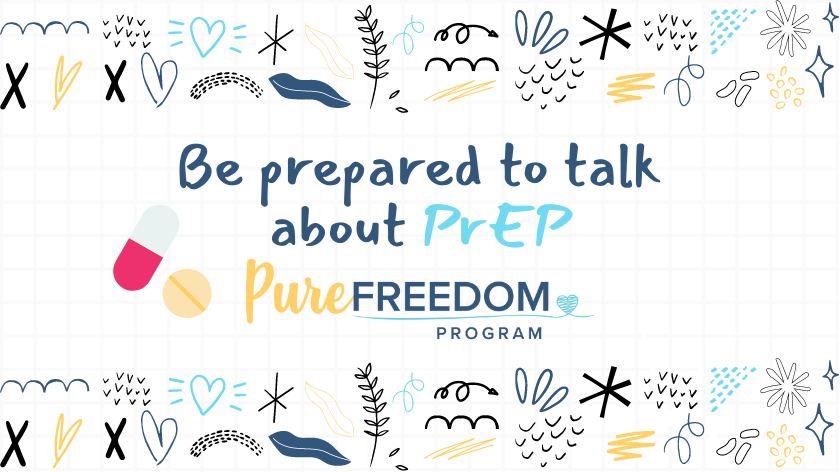30 Jun, 2022

If you are involved in the classroom, you may have received questions about it. And as a parent, you might have heard this 4-letter acronym pronounced out loud by your teenager(s). Do you feel like your students know more about PrEP than you do? We want to equip you with the necessary information to discuss this important topic with them. Consider this article your launchpad to having thoughtful conversations about PrEP and sexual health. Are you ready to be prepared to talk about PrEP?
What is PrEP?
PrEP stands for Pre-Exposure Prophylaxis. As its name suggests, it’s a “prophylactic” drug, which means that it’s used to prevent diseases from occurring.
In the case of PrEP, it can reduce someone’s risk of getting infected with HIV through sex or through the injection of drugs.
The FDA approved the first PrEP medicine (Truvada) in 2012. Later on, two other drugs were developed: Descovy, which, like Truvada, comes in pill form, and Apretude, which is a shot.
How does it work?
HIV is a virus that targets cells from the immune system called “T cells” (or “white cells”, or “CD4 cells”). These cells are crucial in fighting against infections and diseases. But when HIV enters the body, it starts killing them. As a result, the infected person’s defenses decrease, and as their number of T cells becomes low, they are given a diagnosis of AIDS.
The way PrEP works is by setting up “fortified walls” around T cells to prevent the HIV virus from getting into them and replicating. However, for this to be true, PrEP needs to be taken daily. Missing a dose means that the probability of infection can rise significantly.
In addition, PrEP doesn’t become effective right away. According to the CDC, someone who engages in anal sex needs to take it for 7 days before the drug starts being effective. For women who have vaginal sex, the drug needs to be taken for 21 days before it becomes effective.
But how effective is it?
So how effective is it really? The CDC website states that PrEP is “99% effective when taken as prescribed”, but only “74% among people who inject drugs”. On the other hand, there are still a lot of unknowns, which is why experts recommend exercising caution.
One of the unknowns involves the effectiveness of the medication in women. Researchers warn that “women are biologically twice as susceptible to HIV during unprotected vaginal sex compared to men, and this risk further increases with unprotected anal sex, if the partner has a high HIV viral load, in the setting of mucosal inflammation, or if either partner has a sexually transmitted infection.”
Moreover, many clinical trials don’t include women to test for the effectiveness of PrEP. Descovy, for example, wasn’t tested on women at all.
Who can use PrEP?
PrEP is being promoted for people at risk of HIV infection. These include those who have a partner diagnosed with HIV, those who engage in anal sex, or who inject drugs. Even then, experts recommend being careful and taking other steps to protect against HIV, such as using condoms. This is because PrEP is not foolproof and breakthrough cases (meaning, people getting infected while taking PrEP) have been reported.
So is PrEP the solution?
Now that you know more about PrEP, what should you answer to a student who is inquiring about PrEP? Is PrEP the solution to prevent HIV infections?
At Pure Freedom, we know that a holistic approach to health, including sexual health, is best. Throughout our research, we have found that students have the highest chance of being healthy and successful when they delay all sexual activity until they are in a stable, committed relationship such as marriage.
While PrEP might be useful in reducing someone’s risk of getting infected with HIV:
- It doesn’t protect against other STIs such as chlamydia and gonorrhea, for which teenagers and young adults are particularly at risk. As a reminder, in 2019, 61% of new cases were in people aged 15-24.
- PrEP may give a false sense of security and as a result, students may start taking more risks. Did you know that when the use of helmets became mandatory for bikers, head injuries actually went up? While it might sound surprising, it makes sense when considering that people tend to adopt more risky behaviors when they feel that there is a safety net to protect them against worst case scenarios.
- Teenage sex in itself is risky, not just because of physical risks but also emotional ones. Several studies have linked early onset sexual activity with a higher risk for depression, anxiety, and low self esteem.
- Last but not least, PrEP is a drug, and just like with any other drug, there are potential risks. Mild side effects include nausea, headaches, fatigue and stomach pain, while more serious complications include loss of bone mineral density and kidney damage.
It’s our mission to help you keep your student(s) safe and healthy. To learn more about our primary prevention approach and its effectiveness, click here. And if you have any additional questions about PrEP, HIV, or about our program, feel free to contact us at purefreedom@lifelinemo.org or at (660) 665-3059. Our educators discuss STI prevention as well as many other topics such as healthy relationships and goal setting in the classroom. We would be happy to come teach your students about how they can build a healthy future for themselves.
Written by Elodie Takamiya.